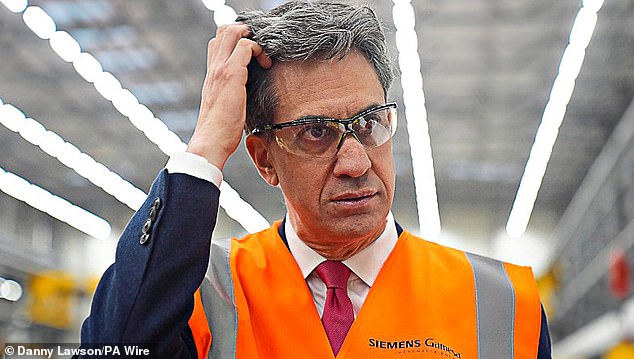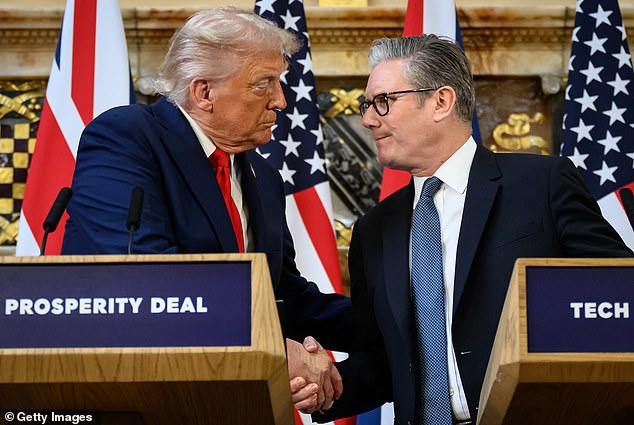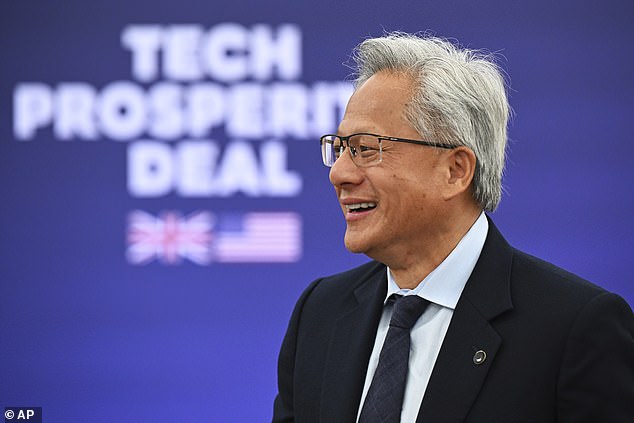Two weeks ago Keir Starmer expressed his full confidence in his Deputy Prime Minister. She was gone the next day. Last week the Prime Minister expressed his full confidence in Our Man in Washington. He was also gone the next day. If only Starmer would express his full support for Energy Secretary Ed Miliband: perhaps he too would speedily go the way of Angela Rayner and Peter Mandelson.
Such subversive thoughts are prompted by the remarks of Jensen Huang, head of microchip giant Nvidia (the world’s most valuable company, worth £3trillion) and one of several US technology ‘masters of the universe’ President Trump brought with him on his second state visit to Britain.
Huang is something of a fan of Britain. ‘The UK is going to be an AI [artificial intelligence] superpower,’ he said. And he’s putting his money where his mouth is with the promise of £2billion to fund British high-tech start ups, including £500million to give us the largest ‘cluster’ of AI computing power in Europe.
But he had an important caveat. The infrastructures AI requires, such as massive computer ‘data farms’, are voracious consumers of electricity.
Huang pointedly said these would require consistent supplies of electricity generated by reliable natural gas and (at a later stage) nuclear power. He even suggested the biggest AI operators might become power generators in their own right, with on-site gas-fired electricity stations to guarantee supply.
But Net Zero zealot Miliband is hell-bent on generating more electricity with renewables, especially wind farms, which are neither consistent nor reliable nor cheap. The dash for Net Zero has already lumbered British heavy industry with some of the most expensive energy costs in the world, speeding up our de-industrialisation as big energy users in metal-making and chemicals either close down or flee abroad.
The ever-diplomatic Huang observed this week that high UK electricity prices were a ‘challenge’ for AI businesses too. There is a real risk of history repeating itself here.
Miliband’s Net Zero obsession has speeded up the decline in our industrial base. What he’s doing to smoke-stack industries he now risks doing to the digital industries of the 21st century before they even get off the ground.

Energy secretary Ed Miliband is hell-bent on generating more electricity with renewables
Miliband is the single biggest roadblock to Britain taking full advantage of the enormous potential of AI.
That alone is reason enough for getting rid of him. There were reports swirling around the time of the recent Cabinet reshuffle that Starmer wanted to move Miliband to housing (where there was a vacancy thanks to Rayner’s defenestration). But the Energy Secretary dug his heels in: Net Zero is his passion. A weak PM capitulated, perhaps fearing the threat ‘soft-Left’ Miliband might become if he flounced off to the backbenches. Starmer will rue the day he gave in.
Nothing, least of all Miliband, should be allowed to get in the way of the prospects that now beckon for Britain in the wake of Trump’s visit.
The coverage has naturally concentrated on the pomp and circumstance, which clearly captivated the US President.
This was British soft power at its formidable best. At a time when we are pretty down on ourselves, it took a US President to remind us not just of the enduring strength of the special relationship but of Britain’s contribution to the world over the years, including to America. You can imagine how they must have felt in Paris and Berlin as Trump waxed lyrical about Britain and its unique association with the richest, most powerful country on the planet.
And he came bearing gifts – a record-breaking £150billion investment from cutting-edge US firms in AI, nuclear energy, life sciences and advanced manufacturing – areas of 21st century endeavour in which Britain is already in the global premier division and in which it now has the opportunity to soar.
The significance of this has not been fully appreciated. The bosses of the world’s greatest companies – Microsoft, Apple, OpenAI, Blackstone, Prologis, BlackRock, Google, Citibank and, of course, Nvidia – came with their chequebooks open to back Britain as prime territory for overseas investment in everything from the latest in AI to small nuclear reactors.
And they did so with the full backing of the Trump administration. Again, pity those looking on from Paris and Berlin. This was Project 25, the blueprint for a second Trump administration compiled during the Biden years, in action. We might have forgotten on this side of the Atlantic that one of its tenets was that Brexit Britain must not be allowed to ‘slip back into the orbit of the European Union’.

US President Donald Trump shakes hands with Keir Starmer at Chequers earlier this week
But Trump has not. The billions on offer this week will make Britain more inclined to look across the Atlantic than the Channel.
But therein lies a problem for Starmer. For he and his Government are committed to the re-alignment of Britain with the EU – and have already started the process. But Britain cannot hope to be a pioneer in AI by falling back under the regulatory framework of Brussels, which has already turned the EU into an AI backwater with its ‘prudential’ (i.e. overly cautious) regulation.
The leaders of some of Europe’s biggest high-tech companies are already pleading with Brussels for a ‘two-year pause’ on AI regulation because of ‘unclear, overlapping and increasingly complex EU regulations’.
Why Starmer wants to force us back into such a regime is a mystery, except that, along with so many in the Labour Party, he has an outdated, rosy view of Europe no longer justified by the facts. He thinks it’s still the future, whereas the reality is that it is in relentless, long-term decline.
Don’t take my word for it. Just listen to Mario Draghi, former head of the European Central Bank and the quintessential EU bureaucrat. ‘The EU,’ he says ‘is trapped in the mid-tech world of the 20th century.’ Even a Europhile Brit like Mandelson has rumbled what’s happening.
‘Brexit has freed us to pursue closer US ties,’ he said in his last major speech as our American ambassador. ‘Britain now has the opportunity to use its regulatory freedom and independence from European law’ to take advantage of all that lies ahead in AI, data centres, supercomputing and advanced nuclear technology.
Of course, American largesse will come at a price. But that is a matter for negotiation. The tech bros so keen to invest their billions in the UK will doubtless want London to scrap its flat-rate 2 per cent digital tax, which hits US giants like Alphabet, Meta and Amazon.
But I wouldn’t go to the wall over that. It’s largely a performative tax designed to show British politicians are standing up to Big Tech. It brings in less than £1billion a year. The US investments unveiled this week will garner far more in tax in the years to come.

Nvidia CEO Jensen Huang has promised £2billion to fund British high-tech start ups, including £500million to give us the largest ‘cluster’ of AI computing power in Europe
More significantly, however, America’s AI giants also want the freedom to ‘scrape’ content from wherever they choose, all the better to improve the efficacy of their machines. But that involves infringing UK copyright, under which our creativity flourishes. Since the creative economy is one of our 21st century superpowers, this predation by US tech needs to be resisted.
That said, the prize for grasping the opportunities of this week’s state visit is enormous.
If the UK becomes one of the world’s leading adopters of AI it will transform our prospects, increasing economic growth, which will cut debt and deficit, and boosting productivity after years of stagnation, which will allow for huge improvements in public and private services.
But it will require from Starmer rather more guts and foresight than he’s shown with his Energy Secretary. Keeping Miliband in place is bad enough.
But if the PM remains determined to drag us back into the EU’s regulatory orbit then he will condemn us to the stagnation that already infects so much of Europe – and the promise of Trump’s second state visit will be squandered.











